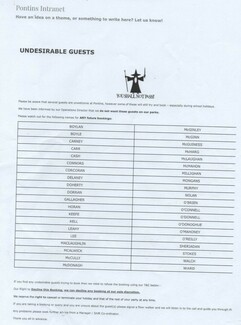Breaking Down the Walls of Discrimination against Gypsies, Roma, and Traveller People

The Equality and Human Rights Commission (EHRC) has issued an "unlawful act notice" to Pontins, a holiday park operator, after finding multiple instances of race discrimination against Irish Travellers, including labelling certain Irish surnames as "undesirable guests" and instructing employees to decline or cancel bookings made under those names, constituting clear breaches of the Equality Act.
Claire Rice, Project Manager at GATE Hertshttps://gateherts.org.uk/, a community-led organisation who oversees the reporting of discrimination and hate crime via their online platform Report Racism GRT, expresses her concern over these discriminatory practices:
In a supposedly progressive society, one would hope that discrimination against marginalised communities would be a thing of the past. Yet, for Gypsies, Roma, and Traveller people, refusal of service remains a pervasive and deeply harmful form of discrimination. This refusal, whether subtle or overt, is not just a denial of a meal or a service; it is a stark reminder of the persistent social exclusion and 'othering' that Gypsy, Roma and Traveller people face daily.
Social exclusion, or 'othering,' inflicts profound psychological effects on individuals and communities as seen in our recent report Identifying Best Practice -. When Gypsies, Roma, and Traveller people are systematically denied access to restaurants, shops, and leisure facilities, it reinforces a sense of being unwanted and unwelcome in society. Families attempting to book a simple meal find themselves turned away, children are ushered out of shops, and women endure invasive scrutiny in nail salons. These acts of exclusion not only dehumanise individuals but also perpetuate harmful stereotypes and prejudices.
The practice of asking Gypsies, Roma, and Traveller people to pay before receiving a service, rather than after, further emphasises the perception that they are untrustworthy. Racial profiling exacerbates this discrimination, with individuals being judged not by their actions but by their ethnicity. Media portrayal and cultural bias only serve to reinforce these negative stereotypes, leading to a vicious cycle of discrimination and prejudice.
The psychological toll of this constant 'othering' cannot be overstated. Individuals often experience distress and confusion as they struggle to reconcile the disparity between their self-perception and the societal perception of them. The impact on mental health is profound, with feelings of shame, self-doubt, and anxiety becoming all too common. Many feel compelled to hide their ethnicity and deny their heritage to avoid discrimination, further eroding their sense of cultural identity and belonging.
Most distressing of all is the effect on children, who are subjected to bullying and harassment simply because of the negative stereotypes associated with Gypsies, Roma, and Traveller people. The refusal of service serves to justify these prejudices, creating a toxic environment where discrimination is not only condoned but normalised.
It is time to break down the walls of discrimination and challenge the deeply ingrained biases that perpetuate the marginalisation of Gypsies, Roma, and Traveller people. This begins with acknowledging the humanity and dignity of every individual, regardless of their ethnicity or background. It requires businesses to examine their practices and policies to ensure they are inclusive and welcoming to all. It demands media representation that reflects the diversity and complexity of Gypsy, Roma and Traveller peoples.
Only by confronting the root causes of discrimination and actively promoting inclusion and diversity can we hope to create a society where everyone is treated with respect, dignity, and equality. It is time to dismantle the barriers that divide us and build a more inclusive and compassionate world for all.
By Claire Rice
(Photograph: The list of 'undesirable names' released to the EHRC by a whistleblower - public domain)